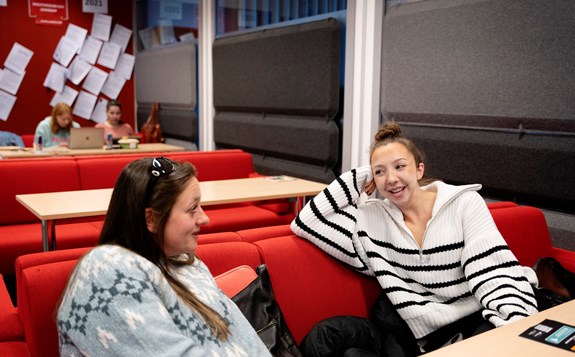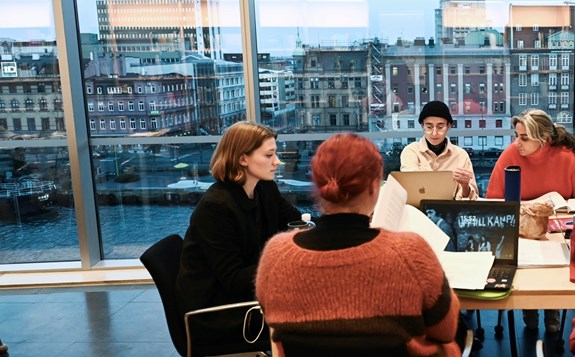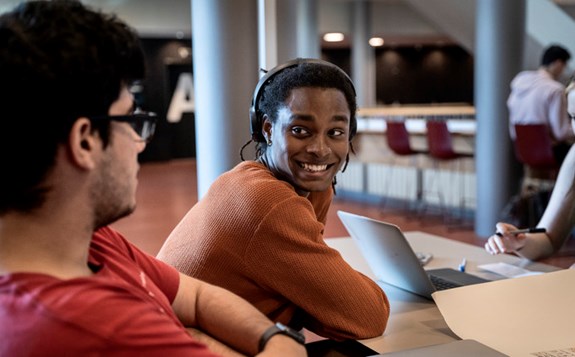We use cookies on this website. Cookies help us deliver the best experience on our website. Read about cookies.
-
- Education
- Education
- Programmes and courses
- Applications and admissions
- Tuition fees
- Scholarships
- Exchange studies at Malmö University
- Study Guidance
-
- After admission
- After admission
- Moving to Malmö
- Pre-orientation
- Arrival guide
-
- About studies at Malmö University
- About studies at Malmö University
- Why choose Malmö University
- Understanding university studies
- Connect with our students
On the page -
- Research
- Research
-
- Doctoral studies
- Doctoral studies
- Doctoral courses
-
- Doctoral schools
- Doctoral schools
- Doctoral school: Education, Learning and Globalisation
- Doctoral school: The National Research School for Professionals in Social Services
- Doctoral school: Learning in Multicultural Societal Contexts
- Doctoral school: ComBine
- Doctoral school: Swedish National Graduate School in Science and Technology Education Research
- Doctoral school: Relevancing Mathematics and Science Education (RelMaS)
- Doctoral school: Sustainable Movement Education
- Doctoral school: Finding ways in a time of great future challenges (FinnFram)
- Doctoral school: Pedagogy and Vocational Skills
- Doctoral school: Culturally Empowering Education through Language and Literature
- Research subjects
-
- Research centres
- Research centres
- Biofilms Research Centre for Biointerfaces
- Citizen Health
- Imagining and Co-Creating Futures
- Institute for Urban Research
- Malmö Institute for Migration Studies
- Literacy and Inclusive Teaching
- Centre for Work Life Studies
- Sustainable Digitalisation Research Centre
- Centre for Sexology and Sexuality Studies
-
- Research publications
- Research publications
- Search publications
- Malmö University Press
- Research events
- Participate in a research study
- Coffee Break Quiz
On the page -
- Collaboration and Innovation
- Collaboration and Innovation
- Innovation
- Collaboration with students
-
- Collaborate with researchers
- Collaborate with researchers
- Labs and facilities
- Culture collaboration
- Support Malmö University
-
- Alumni & Friends
- Alumni & Friends
- Graduation and alumni network
On the page -
- About us
- About us
-
- Faculties and departments
- Faculties and departments
-
- Faculty of Culture and Society
- Faculty of Culture and Society
- Department of Urban Studies
- Department of Global Political Studies
- School of Arts and Communication
-
- Faculty of Education and Society
- Faculty of Education and Society
- Department of Childhood, Education and Society
- Department of Sports Sciences
- Department of Natural Science, Mathematics and Society
- Department of School Development and Leadership
- Department of Culture, Languages and Media
- Department of Society, Culture and Identity
-
- Faculty of Technology and Society
- Faculty of Technology and Society
- Department of Computer Science and Media Technology
- Department of Materials Science and Applied Mathematics
-
- Faculty of Odontology
- Faculty of Odontology
- Master's programmes in Dental Science
- University Dental Clinic
- Management and decision-making paths
-
- Vision, objectives and strategy 2025
- Vision, objectives and strategy 2025
- Global engagement
- Sustainability
- Widened recruitment and participation
- Quality assurance work at the University
-
- Malmö Academic Choir and Orchestra
- Malmö Academic Choir and Orchestra
- Student work – video pieces
-
- Annual Academic Celebration
- Annual Academic Celebration
- Academic traditions
- Meet our new professors
- The University in a troubled world
On the page
Master's programmes in technology
your thing?
Are you interested in computer science, media technology or materials science? Malmö University offers master's programmes in the field of computer science, strategic media development and computational materials science. Scholarships are available for international students. Applications are open until 15 January 2025.
-
Programme
 Programme, master’s level | 120 credits
Programme, master’s level | 120 creditsComputer Science: Internet of Things, Master's Programme (Two-Year)
31 August 2026 - 4 June 2028Malmö | daytime | 100% -
Programme
 Programme, master’s level | 120 credits
Programme, master’s level | 120 creditsComputational Materials Science, Master's Programme (Two-Year)
1 September 2025 - 6 June 2027Malmö | daytime | 100%Open for application31 August 2026 - 4 June 2028Malmö | daytime | 100%31 August 2026 - 4 June 2028Malmö | daytime | 100% -
Programme
 Programme, master’s level | 120 credits
Programme, master’s level | 120 creditsComputer Science: Innovation for Change in a Digital Society, Master's Program (Two-Year)
31 August 2026 - 4 June 2028Malmö | daytime | 100% -
Programme
 Programme, master’s level | 120 credits
Programme, master’s level | 120 creditsComputer Science: Applied Data Science, Master's Program (Two-Year)
31 August 2026 - 4 June 2028Malmö | daytime | 100% -
Programme
 Programme, master’s level | 120 credits
Programme, master’s level | 120 creditsMedia Technology: Strategic Media Development, Master's Programme (Two-Year)
31 August 2026 - 4 June 2028Malmö | daytime | 100%
How to apply
Apply between 15 October and 15 January, 2025. Follow our step-by-step guide on how to apply.
Career
A master's degree in technology gives you the tools you need to begin or advance your career in the industry or in academic research. Graduated students will be well prepared for work in any number of industries currently undergoing rapid digital transformation.
The campus and the city of Malmö provide a global learning environment. You are geographically perfectly positioned to make Malmö your gateway to Europe and its international job market. Malmö is one of Sweden’s fastest-growing metropolitan centres and has a lively start-up scene for the entrepreneurially driven.
Newsletter for future students
Join the newsletter and get updates on application key dates, programmes, courses, and much more.
Student testimonials part two
Computational Materials Science
Computational Materials Science
Meet two students from the master´s programme.
Media Technology: Strategic Media Development
Media Technology: Strategic Media Development
Meet an alumn from the master´s programme.
https://youtube.com/embed/QLmG-34jFTU?si=o7oOUJo0MezyFJl9?enablejsapi=1&rel=0&showinfo=1&controls=1
Video testimonials
Computer Science: Applied Data Science
Computer Science: Applied Data Science
Meet two students from the master's programme.
Computer Science Innovation for Change
Computer Science Innovation for Change
Two students talk about the master´s programme.

Computer Science: Internet of Things
A unique programme focussing on the main technological aspects of IoT, including human factors, innovation and business models. Romina Spalazzese is one of the Programme Coordinators for the Computer Science: Internet of Things master’s programme.
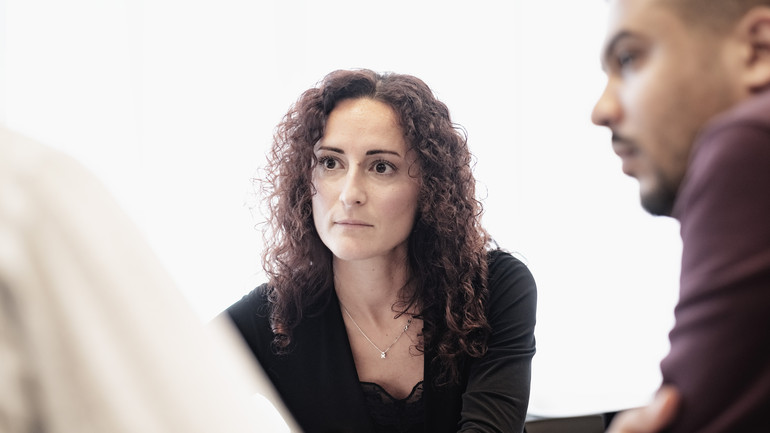
Computer Science: Internet of Things
A unique programme focussing on the main technological aspects of IoT, including human factors, innovation and business models. Romina Spalazzese is one of the Programme Coordinators for the Computer Science: Internet of Things master’s programme.
Who should apply to this master’s programme?
Students and practitioners who want to learn, upgrade, update or expand their competencies in the field of the Internet of Things.
What makes this programme unique?
Computer Science: Internet of Things is the only master's programme in Sweden dedicated to IoT. This programme has a unique focus on the main technological aspects relevant for IoT system developers, while also including human factors as well as innovation and business models.
This programme includes topics that are key elements of the entire IoT value chain. These include connected devices with limited resources; new computing paradigms; user experience for IoT; artificial intelligence (AI) and data management for IoT; software architecture and security for IoT; innovation; and business models. The programme includes both theoretical and practical elements through projects and theses in collaboration with industry and society at large.
In what ways do the knowledge and skills taught in the programme prepare students for the job market?
When we created this programme we gathered insights through collaboration with companies working within the IoT sector. What we learned was that it is very difficult to identify and recruit students that have skills in the complete IoT value chain. This includes people who know how to involve the individual in the loop while at the same time being aware of business aspects and needs.
This programme will be highly useful for the Swedish industry in terms of the IoT knowledge and skills of our students. They will help companies to develop products and services and stay globally competitive. Moreover, these same companies see value in collaborating with this master's programme. Through various activities companies will develop close connections with our students, for example by giving guest lectures and hosting thesis projects.
In short, based on the input from the companies involved, we are confident that this programme meets a demand in the labour market. Our graduating students will be highly employable not only in industry but also in public organisations. The rapid development of different IoT-based smart cities and e-health applications will mean that our students have professional opportunities both in the private and public sectors.
Why should students choose to study at Malmö University?
There are at least five very good reasons why students should choose Malmö University! One is the high-quality education we offer. Another is our well-equipped facilities located in the city centre. A third one is that we are located in the Öresund region, which is home to many information and communications technology companies. The region is a hub from an academic, industrial, and innovation point of view. A fourth reason is that Malmö University offers an international and welcoming environment rich in valuable diversity. The fifth reason is that the University is located in a bike-friendly city that is also very well connected both nationally and internationally through trains and airports. The Copenhagen airport is only around thirty minutes from Malmö central station.
How does the programme prepare students for future doctoral studies?
This programme is very well connected to the Department of Computer Science and Media Technology research environment in general and with the Internet of Things and People (IoTaP) Research Center in particular. Among the alternatives for third-cycle students that we currently offer at Malmö University is a doctoral programme in Computer Science. These doctoral student positions would be very suited for students of the programme.
In particular, through its course topics and formats, the programme constitutes a natural and great locus with the IoTaP core research areas, namely Embedded Intelligence and Interaction Technology.
This programme provides great opportunities to meet and be in close contact with both senior and junior research staff, both doctoral students and postdocs, but also industry practitioners. The programme, by design, involves research and practice-related activities in a number of different courses. This is particularly evident in the second year and the IoT innovation project and master thesis courses.

Computer Science: Applied Data Science
Demand for data scientists is at an all-time high. Radu-Casian Mihailescu is the former Programme Coordinator for the Computer Science: Applied Data Science Master’s programme.
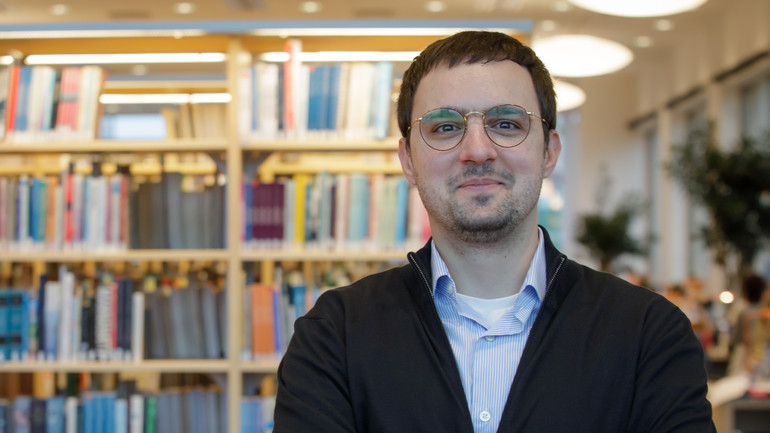
Computer Science: Applied Data Science
Demand for data scientists is at an all-time high. Radu-Casian Mihailescu is the former Programme Coordinator for the Computer Science: Applied Data Science Master’s programme.
Who should apply to this master’s programme?
The Applied Data Science Master’s programme at Malmo University is designed for graduates and professionals aiming to become an expert in the fast-growing field of Data Science, which is arguably the most strategic field for today's emerging digital society. Data has surpassed oil as the world’s most valuable asset, and the effective use of data represents the foundation for today’s fastest-growing companies such as Google, Facebook, Uber or Tesla. As ever more data is being collected every day, data is not sufficient in itself – we need highly skilled professionals who can derive actionable insights from it. This will allow organisations to benefit and unlock new business opportunities. Thus, the programme is specifically designed for those who are aiming to develop an in-depth understanding of the methods and algorithms of data science and acquire expertise that sets them apart in the job market.
What makes the programme unique?
The programme is characterised by a strong emphasis on practice and research. The underlying principle for this programme can be summarised in the words of the Nobel laureate R. Feynman: “What you cannot create, you do not understand." We’ve created the Applied Data Science Master’s programme in response to the growing need from the industry to develop a new class of professionals skilled in both computing and data analytics. To this end, the curriculum prepares graduates to address data-intensive problems from a variety of fields, think critically about data, and drive decision-making processes in the public and private sectors. This is achieved through the study of relevant topics such as big data and cloud computing, artificial intelligence and machine learning, statistical analysis and data visualisation.
In what ways do the knowledge and skills taught in the programme prepare students for the job market?
Demand for data scientists is at an all-time high and data analytics is now fundamental to business and data-driven value-creation. Throughout this programme, students have the opportunity to create their own data analysis projects, enabling them to apply advanced methods to investigate real-world questions. Data and factualness beat opinion every time – so it is key to build skills such as determining how to extract relevant information from massive amounts of data or understanding how computers can learn from experience to make intelligent decisions. By providing an industry-relevant curriculum, we equip students with a set of highly sought-after technical skills meant to give them a competitive edge on the job market. At the same time, the coursework is conceived to draw attention toward the ethical responsibilities of a data scientist. We provide students with the framework to analyse these concerns and the means for using ethical reasoning to suggest improvements to data-driven systems and practices.
Why should students choose to study at Malmö University?
Malmo University is known to provide high-quality education and has deep ties with the surrounding tech industry. In fact, our industry advisory council enables us to make sure that we build the data science skills that employers need in today’s graduates. Students enrolled at Malmö University will benefit from an international and multi-disciplinary learning environment. Moreover, Malmö is one of Europe’s leading cities when it comes to innovation and many of our alumni go on to become successful entrepreneurs. According to Forbes, eight start-up companies are founded every day in Malmö. Meanwhile, the greater Öresund region is one of the most dynamic urban areas in Scandinavia.
How does the programme prepare students for future doctoral studies?
Graduates will be prepared to continue their careers in related doctoral studies or as data science professionals in the industry. In particular, there are synergies with the newly established data-driven systems doctoral school at Malmo University, which provides opportunities for knowledge transfer and further continuation of studies toward a doctorate. During the programme, students are encouraged to get involved in ongoing active research at the Faculty of Technology and Society, especially during their project-based courses and thesis work, where they can further develop their research skills. Our aim is to involve students and welcome them to various seminars that guest researchers and researchers at the faculty deliver on a regular basis.

Computer Science: Innovation for Change in a Digital Society
The only constant in life is change. Patrik Berander is the Programme Coordinator for the Computer Science: Innovation for Change in a Digital Society master’s programme.
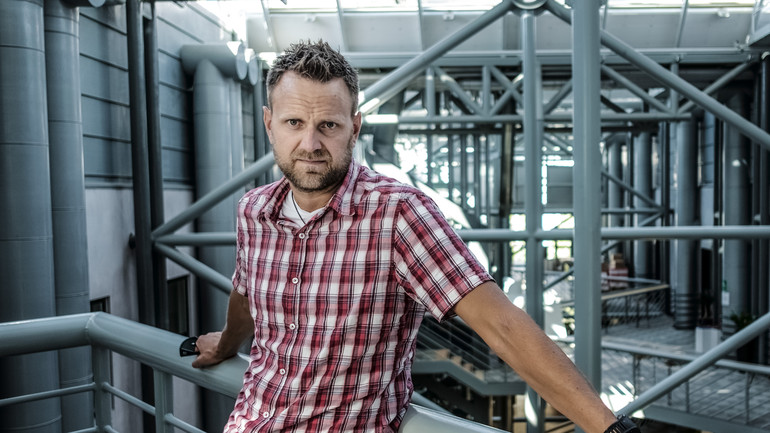
Computer Science: Innovation for Change in a Digital Society
The only constant in life is change. Patrik Berander is the Programme Coordinator for the Computer Science: Innovation for Change in a Digital Society master’s programme.
Who should apply to this master’s programme?
Really anyone with an educational background that includes some computer science. This could, for example, be students with a bachelor’s degree in programming, systems development or interaction design, combined with an interest in innovation, entrepreneurship, business development and management.
What makes this programme unique?
The programme offers a unique dual focus on both technical aspects as well as on innovation, entrepreneurship, business development and management. Many master’s programmes are solely focussed on delving into one of these aspects while this programme blends these perspectives together.
In what ways do the knowledge and skills taught in the programme prepare students for the job market?
There is a saying that ‘the only constant in life is change’. This is very true in society today, with the big challenges we face on many different levels. The need for competent people who can deal with and drive change will only increase over time. Students in the programme will develop skills in change management and also complement their technical abilities with managerial abilities — a combination that is also sought after in the job market.
Why should students choose to study at Malmö University?
In 2013, OECD ranked Malmö as the fourth most innovative city in the world. Malmö has a lively and vibrant ecosystem of businesses and organisations related to innovation and entrepreneurship. During the programme, students will be introduced to, and work with, many stakeholders within this ecosystem.
How does the programme prepare students for future doctoral studies?
Students will interact with several of the research environments at Malmö University in different ways. This will ensure a smooth transition to doctoral studies if you are interested in pursuing a doctorate.
Malmö University
Malmö University is a young, urban and innovative university located in the southernmost region of Sweden. The University has around 24,000 full-time students and offers English-taught programmes at both bachelor's and master's levels. The University’s research profile is characterised by global engagement, community involvement, and a multidisciplinary and challenge-based approach.
Malmö is a vibrant city with a young and diverse population of 350,000. It is an extremely bike-friendly city. Located in the Öresund region, Malmö lies just a short train journey from the Danish capital city, Copenhagen. The region is home to about four million people and offers a buoyant job market with great international career opportunities.

